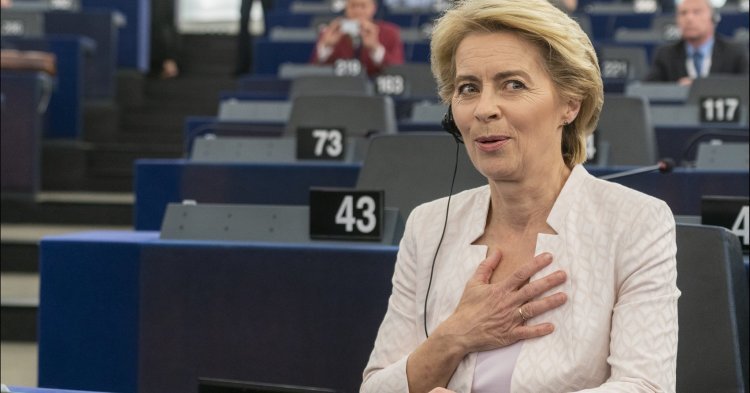Von der Leyen, elected by the European Parliament in July, has asked EU member states to give her at least two candidates, one man and one woman. We are supposed to know the first draft of the next Commission’s composition by 26 August which is the official deadline to nominate Commissioners. Here’s what we can already tell.
Still short of gender balance
First of all, must not forget that 31 October won’t just be President Juncker’s last day at work, but also Brexit day. So considering that the UK won’t have a Commissioner, and that Ursula Von der Leyen herself is a woman, we have 26 Commissioners to nominate – hypothetically, 13 of them men, 13 women.
Including von der Leyen, we currently have nine women out of 27. The following have been nominated by their home countries’ governments:
- for Bulgaria, Mariya Gabriel who is currently the Commissioner for digital economy and society
- for Cyprus, Stella Kyriakides who currently sits in the national parliament;
- for the Czech Republic, Vĕra Jourová who is the current Commissioner for justice, consumers and gender equality;
- for Denmark, Margrethe Vestager who is one of the key figures of the liberal Renew Europe party, and who will be one of the two “First Vice-Presidents” of the new Commission;
- for Estonia, Kadri Simson, the former Minister for economic affairs and infrastructure;
- for Finland, Jutta Urpilainen who is a former finance minister;
- for Malta, Helena Dalli who is a former European affairs and equality minister;
- for Sweden, Ylva Johansson who is the current Minister for employment.
Gender balance will be hard to achieve, given that 12 member states have already confirmed a man as their candidates. So far:
- for Austria, Johannes Hahn who is the current Commissioner for neighbourhood policy and enlargement negotiations;
- for Greece, Margaritis Schinas who has become famous for hosting the Commission’s daily midday press briefings;
- for Hungary, László Trócsányi who is the former justice minister;
- for Ireland, Phil Hogan who is the current Commissioner for agriculture and rural development;
- for Latvia, Valdis Dombrovskis whose current portfolio as a Commissioner includes the euro and financial stability;
- for Lithuania, Virginijus Sinkevičius, the 29-year-old minister for the economy and innovation
- for Luxembourg, Nicolas Schmit who just won a seat in the European Parliament;
- for the Netherlands, Frans Timmermans who was the socialists’ lead candidate in the elections and who will be the other “First Vice-President” of the next Commission;
- for Poland, Krzysztof Szczerski who is the chief of the President’s cabinet;
- for Slovakia, Maroš Šefčovič who has been in charge of the Energy Union in the current Commission;
- for Slovenia, Janez Lenarčič who is the country’s current ambassador to the EU;
- for Spain, Josep Borrell whom the European Council has nominated as the next High Representative for foreign affairs.
The Parliament as an opportunity
If Ursula von der Leyen is to stick to her word, she could only accept one more man from the six member states that haven’t nominated a candidate yet. This won’t be easy because, perhaps more importantly than gender balance, von der Leyen should worrying about the political composition of her Commission.
The European Parliament only gave a narrow majority (just 383 MEPs out of 751) in her favour – so if she doesn’t want any more trouble before November, the composition of the whole Commission should please at least the same number of MEPs.
If the Parliament and von der Leyen are able to act together, her weak majority could be transformed from a weakness into a tool to make member state governments accountable for their choices for individual Commissioners.
If the Parliament isn’t too shy to entertain using its power to reject the whole Commission later in the autumn, that might be the perfect way to effectively guarantee gender balance, give the Greens more Commissioners, or to handle any difficulty with the Italian nominee.
The Parliament needs to demonstrate that what happened with the lead candidate system was an isolated victory for intergovernmentalism.
Though the European Parliament isn’t yet entirely polarised between proponents and opponents of further integration, the Parliament should vote along this clear cleavage. In other words, they should block extremist parties from all government posts. This would complete the defeat of the nationalists in the EU institutions for the entire five-year term. Conversely, it would be a first success for von der Leyen.
The EU is in muddy waters, and the last thing we need is an institutional clash between the supranational and intergovernmental bodies. But at the same time, European citizens want to see more EU, rather than boring and ineffective meetings between heads of states. The next Commission can demonstrate that citizens are listened to, and that representation is guaranteed by those institutions which were designed for the purpose.
Ursula Von der Leyen has a challenge in front of her – but it’s also an opportunity if the Parliament wants to see it that way.





Follow the comments: |
|
